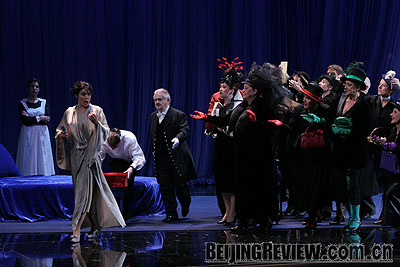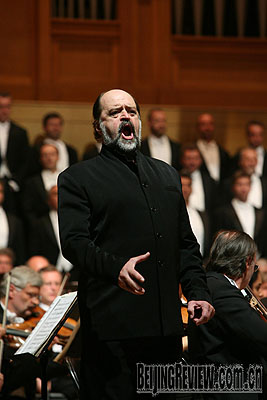By Yuan Yuan
The audience at the Forbidden City Concert Hall was held spellbound on October 2, as they sat back and were spoiled for choice at the opening of the 11th Beijing Music Festival.
Popular Chinese classical singers Liao Changyong, He Hui, Yang Jie, as well as foreign sopranos including Erica Miller, Manuela Uhl and Heidi Stober, took part in the gala performance, with their renditions of melodies from famous operas such as Pace, pace mio Dio from La Forza del Destino and Habanera from Carmen.
Dating back to 1998, the Beijing Music Festival has developed into one of Beijing's entertainment drawcards and has become one of the world's leading classical music festivals, according to Yu Long, conductor and Artistic Director of the Beijing Music Festival for the past 11 years.
 |
|
Actors and actresses from Deutsche Oper Berlin perform opera Der Rosenkavalier on October 5 in Poly Theater. |
Established soloists, renowned orchestras and opera houses from all over the world performed 20 concerts and operas in Beijing this year. The festival focused on grand operas, especially the two masterpieces from the German operatic literature, Der Rosenkavalier and Tannhause, which were performed by Deutsche Oper Berlin.
Deutsche Oper Berlin sent its original troupe, composed of more than 400 people, to perform the two masterpieces. It was the first time this renowned orchestra has sent such a big group to China.
The festival also held a commemorative concert, Bernstein on Broadway, for the 90th anniversary of the birth of Leonard Bernstein, a great American conductor, composer and educator, with his daughter Jamie Bernstein as narrator. The anniversary celebration spanned the globe with two of Bernstein's favorites, On the Town and West Side Story, broadcast in Times Square in New York City.
Spreading the word
Also performed were the more contemporary musical styles of China, showcased by Heroine Trilogy, rearranged by Director Li Liuyi, who finds the perfect balance between Chinese and Western music.
Increasing the popularity of classical music is one of the main aims of this festival. Before every performance, the musicians held free lectures to explain the nuances of the music to the audience. The Deutsche Oper Berlin invited Beijing residents to watch how they rehearse for the operas. Bernstein, now a music critic and music educator, gave two lectures on how to spread classical music to more people based on her father's stories.
The lectures were all held in theaters and universities, including Peking University, one of the most prestigious tertiary institutions in China, and the Central Conservatory of Music, to raise college students' awareness of classical music.
The festival also held a carnival for children to learn how to play different kinds of musical instruments and put on a concert especially catering to a young audience.
Using the Internet to promote classical music was also an option used by festival organizers, who cooperated with kuke.com, a classical music website that provided 100,000 free account numbers for netizens to listen to the classical music on their site.
The festival expects to be followed by a wave that involves more people, especially children, in the wonderful world of classical music. Classical music was introduced to China 35 years ago. Now, more than 50 million children in China are studying violin and piano.
Classical music for all
The major obstacle to raising the popularity of classical music is that it is still considered something elitist by ordinary people in China and around the world. This conception makes it thought to be difficult to understand.
"I am surprised to see the clear separation of people in enjoying classical music, but the situation was kind of similar to that in the United States in my father's days," said Bernstein.
Bernstein said her father liked all music, and he conducted classical music as well as composing music for Broadway. In this way he helped spread the love for both genres of music and people learned that there is no distinction when it comes to enjoying music, she said.
The notion that "music is hard to understand" doesn't only come from the introduction of Western classical music. It has long existed in China's history, which can be proven by many ancient stories.
The Chinese word zhiyin means very close friend, but its literal meaning is "understanding music." So it suggests when you can understand the music played by another person, you can be very close friends.
In the Spring and Autumn Period (770-476 B.C.), there was a great musician named Yu Boya, who was a very good player of qin (ancient Chinese stringed instrument) and his music was considered to be too complicated to understand. One day, however, he met Zhong Ziqi, who could totally understand the content of his music and explain clearly what the melodies represented.
Yu was quite excited to find such a friend and made an appointment for their next meeting. However, Zhong died before the meeting, leaving Yu desperate and tearful. Yu smashed his qin and from that day no one would understand his music again.
But according to Zhou Haihong, Vice President of the Central Conservatory of Music, it is Yu who cannot understand music.
 |
|
Austrian tenor Kurt Rydl performs at an opera gala at the Forbidden City Concert Hall on October 9. |
Zhou has long been endeavoring to spread classical music. He gave many lectures around China on how to enjoy music. His lectures are all very vivid and attract a large number of listeners. Zhou presents many ideas that are fresh and quite different to what has been touted before.
"Actually, everybody in the music circle knows a secret that many other people don't know. That is that all the explanations about music contents are just made up, meaning that you can interpret the music in your own way," said Zhou. He said that as long as you are a human being and you have emotions, you can understand classical music. "Many people were just misled by the explanations," he said.
According to Zhou, a student once told him that he enjoyed pieces of Ludwig van Beethoven and could recall a lot of memories when listening to music. But after the student read experts' explanations of the music, he found out that his understanding was totally "wrong." This made him frustrated to the point that he stopped listening to Beethoven after that.
Freedom to interpret
"Even the greatest musicians have very different or even totally opposite understanding of the same melody," said Zhou, whose idea was echoed by Bernstein, who compared her father with another great conductor, Herbert von Karajan. "They conducted music in quite different styles due to their different understanding of the music, but they are all great conductors," said Bernstein.
The reason that many people don't like symphonies or other classical music might be that classical music has no lyrics that are believed to make the music more understandable, and some melodies are very slow that make people lose patience, said Zhou.
Zhou compared classical music to football matches -- where the audience needs to wait a long time before the players score. "This is the charm of football, that is also why it is regarded as ‘the most exciting game' and has the most fans of any sport around the world. People enjoy the process as well as climax," said Zhou.
It is very hard to find a proper word in Chinese to express the word "classical," so classical music has been translated to yansu yinyue (serious music) or gaoya yinyue (elegant music), which is far from the original meaning and has kept many people away who think they are not qualified to listen to this serious or elegant music.
"Music is the best way to communicate between people from different cultural backgrounds," Zhou said. "There is no separation in enjoying music. Try to enjoy classical music in your own way and believe me, it will make your life more colorful."
(Beijing Review October 27, 2008)